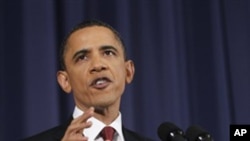A new public-opinion poll suggests trouble ahead for President Barack Obama and indicates most Americans oppose U.S. military involvement in Libya.
The monthly Quinnipiac University poll found voters oppose U.S. involvement in Libya by a margin of 47 to 41 percent, even though 65 percent in the same poll favor the use of force to protect Libyan civilians.
The Quinnipiac poll was conducted mostly before President Obama’s Monday speech on Libya aimed at building domestic support.
Quinnipiac pollster Peter Brown tells VOA that the poll results make it clear that the president will have to continue to build support for any U.S. involvement in Libya.
“In a nutshell, Americans are skeptical," said Brown. "He has a substantial selling job, for want of a better way of putting it, that will have to be ongoing if the U.S. effort is ongoing.”
With that in mind, Mr. Obama has been talking a lot about the necessity of U.S. and international intervention in Libya this week, including a Tuesday speech in New York.
“In Libya, we are showing what is possible when we find our courage and when we fulfill our responsibilities," said President Obama.
Pollster Peter Brown says the American public appears to be suffering from war fatigue, given the ongoing U.S. military commitments in Afghanistan and Iraq.
“I do not think there is any doubt that the involvement in Afghanistan, the involvement in Iraq and now the involvement in Libya has for many Americans raised questions about the wisdom of these policies," he said.
Congressional reaction to the president’s Libya policy has been varied.
Some Republicans want the president to push harder for the ouster of Libyan leader Moammar Gadhafi, even as Mr. Obama insists that is not the goal of the international alliance enforcing the no-fly zone over Libya.
Among them is the president’s 2008 Republican presidential opponent, Senator John McCain of Arizona:
“If our strategy does not succeed in forcing Gadhafi to leave power sooner rather than later, we run the risk of prolonged and bloody stalemate," said McCain.
But Republicans are by no means unanimous on what the United States should do in Libya. The issue has become a major talking point among the growing number of Republicans who are considering a run for president next year, including Minnesota Congresswoman Michele Bachmann.
Bachmann told NBC’s Today program the president’s decision to use force in Libya for humanitarian reasons could open the way for similar U.S. military involvement in any number of countries facing civil strife.
“That would be the basis for the United States to enter into one country after another," said Bachmann. "I do not think that is in the American interest.”
Most Democrats seem to support the president on Libya, but there have been a handful urging the president not to get involved, including Ohio Congressman Dennis Kucinich.
“Things are falling apart at home, while we are searching the world looking for dragons to slay," said Kucinich.
An earlier poll by the Pew Research Center found 47 percent of those surveyed supported U.S. involvement in the Libyan airstrikes, while 36 percent opposed and 17 percent had no opinion.
Stephen Hess is a presidential scholar at the Brookings Institution in Washington. Hess says most Americans seem open to a narrow military involvement in Libya to protect civilians, but generally remain focused on domestic issues like the economy and jobs.
“The American people have been generally favorable to the airstrikes and not very favorable to anything else," said Hess. "We are already in two wars and a trio of wars is not exactly what Americans are interested in at this time when they have a very full platter of problems at home.”
The latest Quinnipiac poll also found that President Obama’s overall approval rating is now at its lowest point since he became president in January of 2009. U.S. voters said they disapprove of the president’s job performance by a margin of 48 to 42 percent, and they oppose his re-election by a margin of 50 to 41 percent.
The survey gave Mr. Obama negative ratings on his handling of the domestic economy, the budget deficit, and foreign policy.
Obama Hits Low Point in New Poll and Libya Does Not Help
- By Jim Malone





